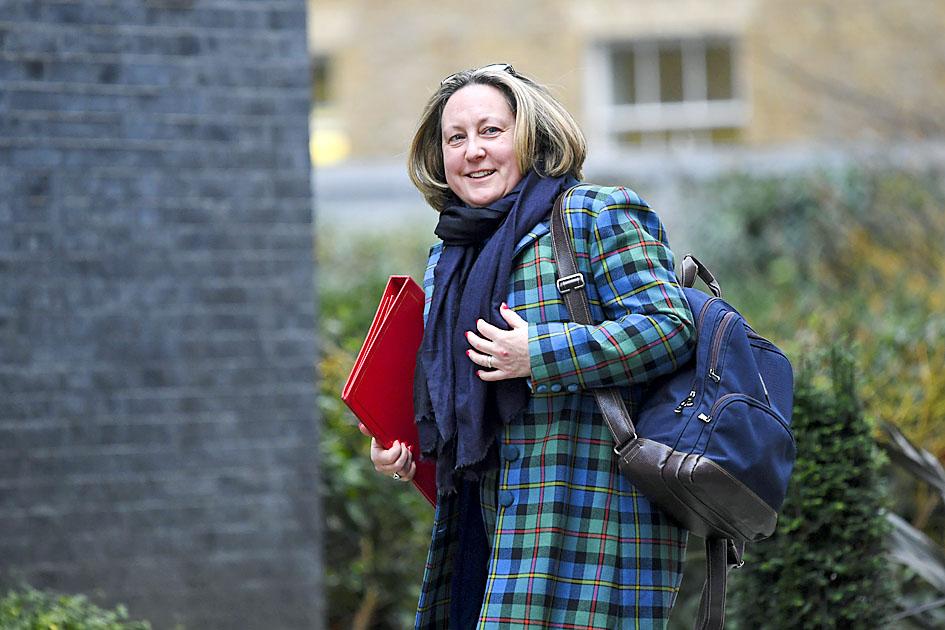Britain will join Taiwan, the US and Australia in backing an EU trade case against China at the WTO over Beijing’s alleged trade curbs on Lithuania, a move that British Secretary of State for International Trade Anne-Marie Trevelyan said would oppose “coercive trading practices.”
The EU last month launched a challenge at the trade body based in Geneva, Switzerland, accusing China of discriminatory trade practices against Lithuania that it says threaten the integrity of the EU’s single market.
“We will request to join the EU’s WTO consultation into these measures as a third party to ensure we combat economic coercion in trade together,” Trevelyan wrote on Twitter.

Photo: Bloomberg
Taiwan, the US and Australia have signaled that they intend to join the consultations.
US Trade Representative spokesman Adam Hodge said that US President Joe Biden’s administration is “deeply concerned” by China’s discriminatory trade practices against Lithuanian goods and EU goods with Lithuanian content.
“We will continue working with Lithuania, the EU, and like-minded allies and partners to push back on the PRC’s [People’s Republic of China] coercive economic and diplomatic behavior,” Hodge said in a Jan. 27 statement. “The United States will request to join these WTO consultations in solidarity with Lithuania and the European Union.”
Vilnius is under pressure from China to reverse a decision last year to allow Taiwan to open a representative office in the capital under its own name.
China has downgraded diplomatic ties with the Baltic nation and pressured multinationals to sever ties with it.
The challenge at the WTO allows 60 days for the parties to confer to reach a settlement. If none is reached, the EU may choose to launch a formal dispute that would set up a WTO panel to study its claims against China.
A Geneva-based trade official said that the participation of other Western countries, assuming they are not blocked by Beijing, would be “helpful” to the EU’s case.
“If you have other members arguing on your behalf and putting forward arguments, I think the panel would look at that,” he said.

INVESTIGATION: The case is the latest instance of a DPP figure being implicated in an espionage network accused of allegedly leaking information to Chinese intelligence Democratic Progressive Party (DPP) member Ho Jen-chieh (何仁傑) was detained and held incommunicado yesterday on suspicion of spying for China during his tenure as assistant to then-minister of foreign affairs Joseph Wu (吳釗燮). The Taipei District Prosecutors’ Office said Ho was implicated during its investigation into alleged spying activities by former Presidential Office consultant Wu Shang-yu (吳尚雨). Prosecutors said there is reason to believe Ho breached the National Security Act (國家安全法) by leaking classified Ministry of Foreign Affairs information to Chinese intelligence. Following interrogation, prosecutors petitioned the Taipei District Court to detain Ho, citing concerns over potential collusion or tampering of evidence. The

‘FORM OF PROTEST’: The German Institute Taipei said it was ‘shocked’ to see Nazi symbolism used in connection with political aims as it condemned the incident Sung Chien-liang (宋建樑), who led efforts to recall Democratic Progressive Party (DPP) Legislator Lee Kun-cheng (李坤城), was released on bail of NT$80,000 yesterday amid an outcry over a Nazi armband he wore to questioning the night before. Sung arrived at the New Taipei City District Prosecutors’ Office for questioning in a recall petition forgery case on Tuesday night wearing a red armband bearing a swastika, carrying a copy of Adolf Hitler’s Mein Kampf and giving a Nazi salute. Sung left the building at 1:15am without the armband and apparently covering the book with a coat. This is a serious international scandal and Chinese

Seventy percent of middle and elementary schools now conduct English classes entirely in English, the Ministry of Education said, as it encourages schools nationwide to adopt this practice Minister of Education (MOE) Cheng Ying-yao (鄭英耀) is scheduled to present a report on the government’s bilingual education policy to the Legislative Yuan’s Education and Culture Committee today. The report would outline strategies aimed at expanding access to education, reducing regional disparities and improving talent cultivation. Implementation of bilingual education policies has varied across local governments, occasionally drawing public criticism. For example, some schools have required teachers of non-English subjects to pass English proficiency

TRADE: The premier pledged safeguards on ‘Made in Taiwan’ labeling, anti-dumping measures and stricter export controls to strengthen its position in trade talks Products labeled “made in Taiwan” must be genuinely made in Taiwan, Premier Cho Jung-tai (卓榮泰) said yesterday, vowing to enforce strict safeguards against “origin laundering” and initiate anti-dumping investigations to prevent China dumping its products in Taiwan. Cho made the remarks in a discussion session with representatives from industries in Kaohsiung. In response to the US government’s recent announcement of “reciprocal” tariffs on its trading partners, President William Lai (賴清德) and Cho last week began a series of consultations with industry leaders nationwide to gather feedback and address concerns. Taiwanese and US officials held a videoconference on Friday evening to discuss the